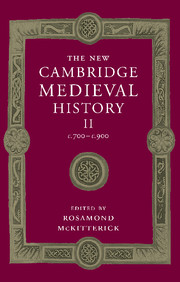Book contents
- Frontmatter
- PART I POLITICAL DEVELOPMENT
- PART II GOVERNMENT AND INSTITUTIONS
- PART III CHURCH AND SOCIETY
- PART IV CULTURE AND INTELLECTUAL DEVELOPMENTS
- 25 Eighth-century foundations
- 26 Language and Communication in Carolingian Europe
- 27 The Carolingian renaissance: education and literary culture
- 28 Theology and the organisation of thought
- 29 Book production in the Carolingian empire and the spread of Caroline minuscule
- 30 Art and architecture
- Conclusion
- Appendix genealogical tables
- List of primary sources
- Bibliography of secondary works arranged by chapter
- Index of manuscripts
- General index
- Frontispiece">
- Plate section
- Map 4 Charlemagne’s Europe and Byzantium, 814
- Map 19 The ecclesiastical provinces of western Europe 700-900
- Map 20 Carolingian schools, scriptoria and literary centres
- Genealogical table X: Wessex
- References
28 - Theology and the organisation of thought
from PART IV - CULTURE AND INTELLECTUAL DEVELOPMENTS
Published online by Cambridge University Press: 28 March 2008
- Frontmatter
- PART I POLITICAL DEVELOPMENT
- PART II GOVERNMENT AND INSTITUTIONS
- PART III CHURCH AND SOCIETY
- PART IV CULTURE AND INTELLECTUAL DEVELOPMENTS
- 25 Eighth-century foundations
- 26 Language and Communication in Carolingian Europe
- 27 The Carolingian renaissance: education and literary culture
- 28 Theology and the organisation of thought
- 29 Book production in the Carolingian empire and the spread of Caroline minuscule
- 30 Art and architecture
- Conclusion
- Appendix genealogical tables
- List of primary sources
- Bibliography of secondary works arranged by chapter
- Index of manuscripts
- General index
- Frontispiece">
- Plate section
- Map 4 Charlemagne’s Europe and Byzantium, 814
- Map 19 The ecclesiastical provinces of western Europe 700-900
- Map 20 Carolingian schools, scriptoria and literary centres
- Genealogical table X: Wessex
- References
Summary
the Carolingian age saw a vast expansion of Christian territory, and a systematic attempt to establish a Christian civilisation throughout that territory. ‘The doctrine of the evangelists shines through the whole world; we hold it in unanimity and faithfully preach it’, Alcuin wrote to Felix during the Adoptionist controversy, and he told Charlemagne, ‘Your holy will and the power ordained by God everywhere defends the catholic and apostolic faith and works strongly to expand the Christian empire and you are zealous to defend, to teach and to propagate the truth of the apostolic faith.’
The faith was defended through affirming the authority of bishops and archbishops: the clergy were trained to understand the Creed, celebrate the Mass and baptism and use penitentials, and their flocks were instructed by means of explanations of the Trinity, the Lord’s Prayer, the Ten Commandments and the Creed, and through the reading of homilies.
This expansion involved explanations of the Christian faith to recent converts from Germanic paganism, who had to learn what comprised ‘the cup of life and salvation’ which they were offered. At the same time clergy familiar with Carolingian education tried to formulate accounts of the nature of the redemptive power of the church and the meaning of its doctrine and worship, raising the threat of heresy and challenging the Carolingian episcopate to pronounce formulae of orthodoxy. In contrast to later Merovingian synods, Carolingian synods and the assemblies of nobles and clergy were often concerned with statements of Christian faith and the correct interpretation of religious principles.
Keywords
- Type
- Chapter
- Information
- The New Cambridge Medieval History , pp. 758 - 785Publisher: Cambridge University PressPrint publication year: 1995
References
- 8
- Cited by

